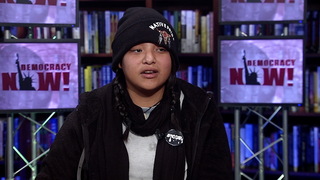
Related
Guests
- Cody Hallmember of the Cheyenne River Sioux Tribe.
We speak with Cody Hall of the Cheyenne River Sioux Tribe, who had a warrant issued for his arrest for two misdemeanors of criminal trespass for land defense actions related to the Dakota Access pipeline and was arrested in a dramatic traffic stop that he says involved at least 18 law enforcement officials. On Monday, he learned the charges were dropped, but says he is still under surveillance.
Transcript
AMY GOODMAN: We end today’s show with Cody Hall of the Cheyenne River Sioux Tribe. He had two arrest warrants—he had an arrest warrant issued for two misdemeanors of criminal trespass for land defense actions. On Monday, he learned the charges were dropped. I spoke to Cody over the weekend about his arrest.
CODY HALL: In the manner of which I was arrested, was treated like—like I was the Native Osama, with at least 18 state officers that got out of their squad cars when I was arrested on a highway, Highway 1806, going up to Bismarck.
AMY GOODMAN: So, then you were taken to the Morton County jail in Mandan?
CODY HALL: Yeah, yep. Yeah, I was taken there, and I was met with state, you know, police officers dressed in their—you know, in their gear, and then also just really, you know, villainized. You know, just like I said, just—you know, FBI wanted to question me. I invoked my right, you know, silence.
AMY GOODMAN: Have you been targeted since your arrest?
CODY HALL: Yes, yes, I have been targeted. As I look at, you know, side mirrors and rear view mirrors, you know, I have DAPL security in their rented trucks that they drive around with no license plate on them. And so, I like to kind of play a game, and I’ll just drive around a little bit, just to see if that vehicle is tailing me. And sure enough, I get a lot of, you know, vehicles tailing me in the city.
AMY GOODMAN: We also spoke with Cody Hall about his experience inside the Morton County jail, including how he was strip-searched.
CODY HALL: As I exited out of the vehicles and entered Morton County, I came up an elevator, and as the elevator opened up, I was met with state police. And then, you know, of course, Morton County people were there to book people, but—and then, from there, started the process of the booking, and then, again, you know, went into a private room, where they ask you to, you know, get naked. You know, they had my arms. They, you know, kind of like extend your arms out. And you’re fully naked. And they have you, you know, lift up your genitals and bend over, you know, cough. And so, it’s really one of those tactics that they try to break down your mentalness of everyday life, because not every day do you wake up and say, “Hey, I’m going to get, you know, naked and have somebody search me today,” you know? That’s a private—you know, that’s a private feeling for you, when you get naked, so…
AMY GOODMAN: And four days later, when you were finally released—they hadn’t allowed you to go out on bail or bond for those four days—you came before a judge in the orange jumpsuit?
CODY HALL: Yes, yes, I sat in the court office in my orange jumpsuit, locked, you know, still handcuffed, exited out of the courtroom. And as I left the courtroom, there were 20 or so state police all in their bullet-proof vests, everything just looking, you know, like—you know, like they’re going into action of some sort. And then they literally had a line from the courtroom to the door that connects you to the county jail. And my mother walked out with me. And as we got to the door, they were opening the door up. And as I looked behind me, my mother and I, all of the cops then proceeded to kind of swarm.
AMY GOODMAN: That was water protector Cody Hall of the Cheyenne River Sioux Tribe. The charges were dropped against him. Special thanks to Denis Moynihan, Hany Massoud, Laura Gottesdiener and John Hamilton.












Media Options